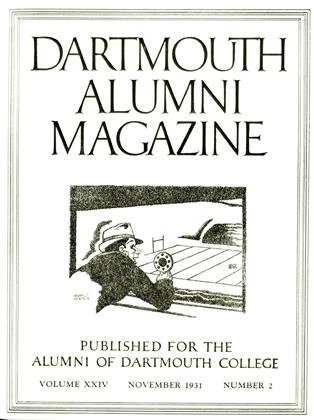OLD HABITS die hard. It is surely more than thirty years since the ancient methods of pronouncing Latin were discarded in favor of the new; and yet, for purposes of non-classroom use, the old pronunciations seems to endure in full force and effect. One who attempted to utter such a phrase as "E pluribus unum" aloud in the manner now inculcated in the schools would hardly be comprehensible to the multitude. The law retains its numerous maxims in the guise made familiar by long usage, and learn'd judges have waxed almost profane over young attorneys who, fresh from the schools, gave the ancient saws their modern twist. But perhaps in no respect does the changed method operate to produce more embarrassment than in dealing, in spoken speech, with the terms alumni and alumnae.
Unfortunately the adherent of modern doctrines must pronounce these words in a way to indicate, to one affecting the older mode, that he intends precisely the opposite of what he really does intend. It is all very well, so long as one deals only with the singular alumnus, or alumna. It is only in the plural, in which form the terms are most often used, that confusion begins. By a modern, "alumnae" must be pronounced as old-timers pronounce "alumni"—and vice versa.
Possibly we should have a special rule, decreeing that for such purposes the older fashion shall prevail. Fully nine-tenths of those who use these words do that already, and the ultra-precious might as well conform as being the smaller number, though they may be entirely right in their notion as to the way in which Cicero would have spoken these words. Tradition sanctions alumni with the "i" long, as in "vile"; and not with the sound of "i" in "Martini."
By the way, how ancient is this word in its commonly accepted sense of a college or school graduate? When the New English Dictionary was first issued, perhaps forty years ago, "alumnus" was defined as a nursling; a pupil of any school, university, or other seat of learning." But that is precisely what it does not mean now. Students in schools, universities and other seats of learning are not alumni at all. They must graduate before they attain this honorable estate. When did this change come to pass? Even those of us who remember small Latin and less Greek are aware that by deriviation the term comes from "alere" to nourish and meant originally one who is nourished, rather than one who is being nourished no longer but who has severed the home ties and is careering on his own. Instead of being nurslings, alumni are those who have been nurslings once in years gone by perhaps fifty or more. It is probable enough that usage has differed in England and America. At all events James Monroe, who graduated in 1771 at Princeton, became the first president of the Alumni Association of Nassau Hall at a date long before the New English Dictionary was dreamed of.
This, however, is mere pedantry. We all know what alumni are now, and most of us agree as to the way in which the word should be pronounced. The point labored here is primarily that a complete uniformity in pronunciation would be desirable to secure.
It occurs to us in closing that, as things go now, the alumnus is often less the nourished than the nourisher. Particularly in these days of economic stress is it necessary for him to perform that function—to make return for the services done him in youth by his Alma Mater, lest she come to poverty in her gray hairs. He raises alumni funds, which enable the' colleges to keep going and growing. He demands, and is allowed, a stronger voice in his foster-mother's domestic affairs. He is not infrequently denounced in the public prints as a pestilential parasite on the body of collegiate education, and derided as an old fogy by the progressive young nurslings on the campus, who seldom reflect that they, in a few short years, will become alumni too, with all the inhibitions, propensities and signal dishonors which undergraduates usually associate with the name. Still the word means what it means, regardless of what it originally implied; and it is pleasant for those of us who have become alumni to believe that ours is an honorable condition, conferring among other things a capacity for service in sustaining that which once kindly nourished us usually at a deficit.
 View Full Issue
View Full Issue
More From This Issue
-
 Article
ArticleThe Class of Nineteen Thirty-five
November 1931 By E. Gordon Bill -
 Sports
SportsFootball at Dartmouth in the Year 1931
November 1931 By Sidney C. Hayward -
 Class Notes
Class NotesCLASS of 1910
November 1931 By "Hap' Hinman -
 Class Notes
Class NotesCLASS of 1930
November 1931 By Albert I. Dickerson -
 Class Notes
Class NotesCLASS of 1926
November 1931 By J. Branton Wallace -
 Class Notes
Class NotesCLASS of 1929
November 1931 By Frederick William Andres
Article
-
 Article
ArticleWITH THE BIG GREEN TEAMS
May 1961 -
 Article
ArticleIllinois Politics Come to Hanover
Mar/Apr 2009 -
 Article
ArticleHanover Browsing
December 1955 By HERBERT F. WEST '22 -
 Article
ArticleFurther Mention
January 1975 By J.H. -
 Article
ArticleWhispers of History
October 1995 By Monica f. Oberkofler'96 -
 Article
ArticlePhiladelphia
October 1959 By RUSSELL C. DILKS '51

